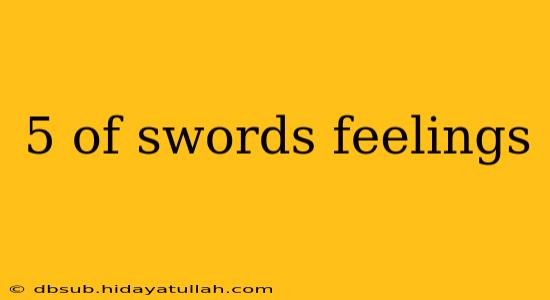The Five of Swords in tarot often evokes strong, often negative, feelings. Understanding these feelings is crucial to interpreting the card's message in a reading and applying its lessons to your life. This exploration delves into the complex emotional landscape associated with the Five of Swords, examining its nuances and providing insights into how to navigate its challenging energies.
Core Feelings Associated with the Five of Swords
The dominant feelings associated with the Five of Swords are those of conflict, defeat, and regret. This is not simply a card of simple disagreement; it points to a conflict marked by ruthlessness, a lack of compassion, and often, an unnecessary victory achieved at a significant cost.
- Aggression and Hostility: The imagery of the lone figure triumphantly standing over fallen opponents suggests aggression and a willingness to inflict harm, even if it's unnecessary. The feelings associated can be those of anger, resentment, and a sense of superiority.
- Defeat and Humiliation: However, even for the victor, the card doesn't promise lasting satisfaction. The hollow victory often leaves a lingering feeling of defeat, particularly if the fight was unnecessary or caused undue suffering. The feeling of shame or humiliation can be surprisingly strong, even if you technically “won”.
- Regret and Remorse: The Five of Swords is a card of harsh lessons learned. The feelings of regret and remorse stem from understanding the unnecessary pain inflicted and the potential damage to relationships and self-respect. This is often coupled with a sense of isolation and loneliness stemming from the fallout of the conflict.
- Bitterness and Resentment: Holding onto bitterness and resentment after a conflict is a key characteristic of the Five of Swords energy. These feelings can be deeply ingrained and hinder future growth and relationships.
- Isolation and Loneliness: The solitary figure in the card often represents the isolation and loneliness that comes from conflict and the breakdown of trust. The feeling of being estranged from others is prevalent here.
Understanding the Nuances: Not Always About External Conflict
While the imagery depicts a physical battle, the Five of Swords' emotional impact isn't limited to external conflicts. It can also represent:
- Internal Conflicts: The card can symbolize internal struggles, such as battling self-doubt or conflicting desires. The feelings of defeat and regret can then stem from self-sabotage or choices made against one's best interests.
- Unnecessary Competition: Even in seemingly positive situations, the Five of Swords can indicate a competitive spirit that is overly aggressive and ultimately counterproductive. The feeling here might be one of anxiety and a desperation to prove oneself at any cost.
- Poor Decision-Making: The card often points to poor judgment and impulsive actions that lead to regret and negative consequences. The feeling of disappointment in oneself is particularly prominent in these cases.
Healing and Moving Forward
The Five of Swords is not a card that encourages dwelling on the past. While acknowledging the feelings associated with it is important, the true power lies in learning from the experience.
- Self-Reflection: Examine the events that triggered the feelings. What could you have done differently? How can you avoid repeating the pattern in the future?
- Forgiveness: Forgiving yourself and others is crucial for healing. Holding onto resentment only prolongs the negative emotions associated with the Five of Swords.
- Setting Boundaries: Learning to set healthy boundaries is key to preventing future conflicts. This involves recognizing your own needs and assertively communicating them.
- Seeking Support: Talking to a trusted friend, family member, or therapist can help process difficult emotions and develop strategies for coping with future challenges.
By understanding the complex range of feelings associated with the Five of Swords and actively working toward healing and growth, you can transform the card’s challenging energy into a catalyst for positive change. It’s a card of lessons, not just of loss. The true victory lies in the ability to learn from the mistakes and build a stronger, more compassionate future.
